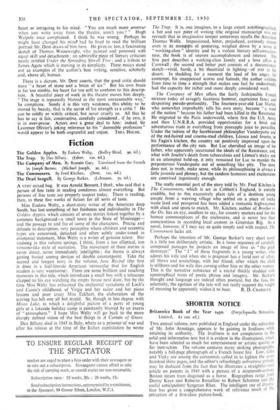Fiction
The Commoners. By Fred Kitchen. (Dent. los. 6d.) The Dead SeagulL By George Barker. (Lehmann. 75. 6d.) A VERY mixed bag. It was Arnold Bennett, I think, who said that a person of fine taste in reading condemns almost everything. But persons of fine taste are properly suspect today. There is reading, then, in these five works of fiction for all sorts of taste.
Miss Eudora Welty, a short-story writer of the American deep South, has lost something of her freshness and individuality in The Golden Apples, which consists of seven stories linked together by a common background—a 'small town in the State of Mississippi— and the passage to and fro of some of the characters. Precise and delicate in description, very perceptive where children and eccentric types are concerned, detached and often subtly under-toned in emotional statement, Miss Welty is a writer of genuine talent. Her undoing in this volume springs, I think, from a too elliptical, too virtuoso-like style of narration. The movement of these stories is never direct, never immediately intelligible ; the theme is always getting buried among devices of double counterpoint. Take the second and longest story in the volume, June Recital (the first 'is done in a half-literate American vernacular that for English readers is very wearisome). There are some brilliant and touching moments in this tale, which introduces a small boy with a telescope clapped to his eye watching the empty house next door, but by the time Miss Welty has exhausted the orchestral variations of Loch's and Cassie's childhood, of Virgie and her sailor and her piano lessons and poor crazy Miss Eckhart, the elaboration of the scoring has left one all but stupid. So, though in less degree, with Moon Lake, in which a delightful picture of a party of young girls at a lakeside holiday camp is constantly blurred by an excess of " atmosphere." I hope Miss Welty will go back to the more sharply defined vision of the best things in A Curtain of Green.
Dan Billany died in 1945 in Italy, where as a prisoner of war and after his release at the time of the Italian capitulation he wrote The Trap. It is, one imagines, to a large extent autobiographical, a hot and raw piece of writing (the original manuscript was not revised) that in imaginative temper sometimes recalls the American Thomas Wolfe. Impassioned, bitter, prejudiced, curiously sincere even in its montilts of posturing, weighed down by a sense of " working-class " identity and by a violent literary self-conscious. ness, the book is of uneven accomplishment and interest. The first part describes a working-class family and a love affair in Cornwall ; the second and better part consists of a documentary sketch—vivid, harsh, a bit theatrical in lighting—of war in the -desert. In shedding for a moment the load of his anger, his contempt, his unappeased scorns and hatreds, the author exhibits from time to time a strength that makes one feel he undoubtedly had the capacity for richer and more deeply considered work.
The Company of Men offers the fairly fashionable French mixture today of savagely facetious humour, capricious fancy and despairing pseudo-profundity. The fourteen-year-old Luc Martin, who somewhat improbably tells his own story, became " a ward of the nation " because his father had been killed in the Resistance. He migrated to the Paris underworld, where first the U.S. Army and then U.N.R.R.A. provided opportunities for a brisk and adventurous trade in everything from pineapple juice to penicillin. Under the tuition of the harebrained philosopher Vanderputte and of the red-haired and cinema-mad children, Leonce and Josette, in his Fagin's kitchen, the country rat positively improved upon the performance of the city rats. But Luc cherished an image of his father, who apparently incarnated the ideals of the Resistance, and, what with Josette's death from tuberculosis and Ldonce's sticky end in an attempted hold-up, it only remained for Luc to murder the preposterous Vanderputte out of something like pity. The story does not, in truth, make sense, while its philosophising is always a little juvenile and phoney, but the random humours and excitements are contrived ingeniously enough.
The really essential part of the story told by Mr. Fred Kitchen in The Commoners, which is set in Cobbett's England, is entirely credible, but to this excessively plain tale of a destitute young couple from a weaving village who settled on a piece of rocky waste land and prospered has been added a romantic highwayman with cloak and spurs to match. Mr. Kitchen, author of Brother to the Ox, has an eye, needless to say, for country matters and for the human commonplaces of the enclosures, and is never less than conscientious in recording local custom in Greetstan Rig. As a novel, however, if "I may say so quite simply and with respect, The Commoners lacks art.
Perhaps the intention of Mr. George Barker's very short novel is a little too deliberately artistic. In a loose sequence of carefully composed passages he projects an image • of love as " the great destroyer." The " I " of these fragments is a young writer, who adores his wife and when she is pregnant has a lurid sort of affair, all blows and scratchings, with her friend, after which the child is stillborn and his wife dies cursing either him or the other woman. This is the narrative substance of a recital thickly studded with apostrophical turns of poetic phrase and imagery. Mr. Barker's thought and language are indeed often poetical, but the fuss, the solemnity, the egotism of the tale will not really support the weight of meaning he apparently wishes it to bear. R. D. CHARQUES.






































 Previous page
Previous page